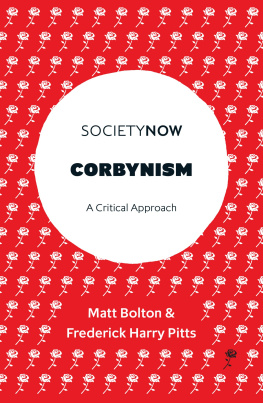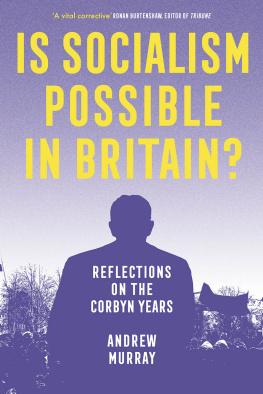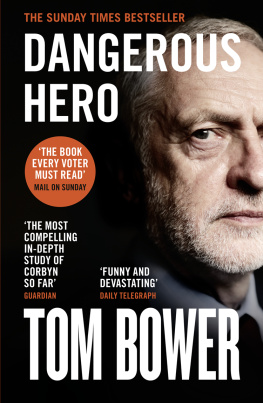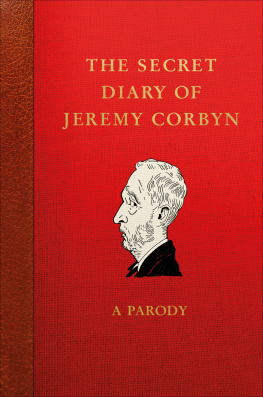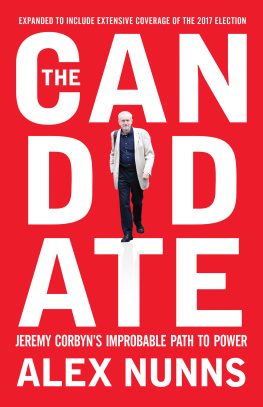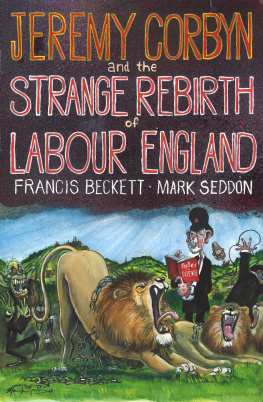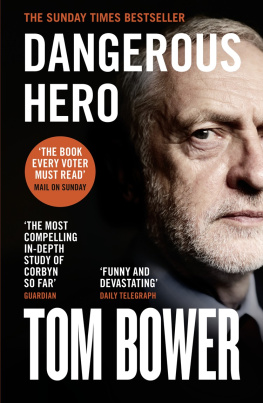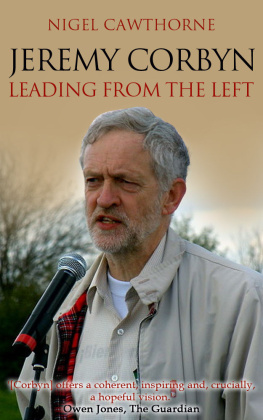CORBYNISM
A Critical Approach
SOCIETYNOW
SocietyNow: short, informed books, explaining why our world is the way it is, now.
The SocietyNow series provides readers with a definitive snapshot of the events, phenomena and issues that are defining our twenty-first century world. Written by leading experts in their fields, and publishing as each subject is being contemplated across the globe, titles in the series offer a thoughtful, concise and rapid response to the major political and economic events and social and cultural trends of our time.
SocietyNow makes the best of academic expertise accessible to a wider audience in order to help readers untangle the complexities of each topic and make sense of our world the way it is, now.
Internet Celebrity: Understanding Fame Online
Crystal Abidin
Selfies: Why We Love (and Hate) Them
Katrin Tiidenberg
Becoming Digital: Towards a Post-Internet Society
Vincent Mosco
Understanding Brexit: Why Britain Voted to Leave the European Union
Graham Taylor
The Trump Phenomenon: How the Politics of Populism Won in 2016
Peter Kivisto
CORBYNISM: A CRITICAL APPROACH
MATT BOLTON
University of Roehampton, UK
AND
FREDERICK HARRY PITTS
University of Bristol, UK

United Kingdom North America Japan India
Malaysia China
Emerald Publishing Limited
Howard House, Wagon Lane, Bingley BD16 1WA, UK
First edition 2018
Copyright Matt Bolton and Frederick Harry Pitts
Published under exclusive licence by Emerald Publishing Limited
Reprints and permissions service
Contact:
No part of this book may be reproduced, stored in a retrieval system, transmitted in any form or by any means electronic, mechanical, photocopying, recording or otherwise without either the prior written permission of the publisher or a licence permitting restricted copying issued in the UK by The Copyright Licensing Agency and in the USA by The Copyright Clearance Center. No responsibility is accepted for the accuracy of information contained in the text, illustrations or advertisements. The opinions expressed in these chapters are not necessarily those of the Author or the publisher.
British Library Cataloguing in Publication Data
A catalogue record for this book is available from the British Library
ISBN: 978-1-78754-372-0 (paperback)
ISBN: 978-1-78754-369-0 (E-ISBN)
ISBN: 978-1-78754-371-3 (Epub)

CONTENTS
First Liberalism is identified with Capitalism;
then Liberalism is made to walk the plank;
but Capitalism is no worse for the dip, and
continues its existence unscathed under a new alias.
Karl Polanyi
PREFACE
At the time of writing, this is the first book to set itself the sole task of taking Corbynism seriously and critically as a semi-coherent set of ideas. It has been impossible to keep up with the books on Jeremy Corbyns leadership of the Labour Party or the wider Labour left published over the course of the period in which we were developing the arguments and analyses presented here. But these books provide somewhat different angles on the topic placing Corbyn in the context of the longer history of the Labour left, examining the practical political programme or movement attached to him, or casting him as the antihero in the triumph-against-adversity tale of how an unambitious backbencher was thrust into the political limelight and as such speak for themselves.1
This book, on the other hand, adds to this existing and still-growing literature a slightly more conceptual, analytical and abstract objective. This is, in short, to provide the reader with a critical orientation towards the foundations and implications of the rapidly germinating but theoretically deep-rooted intellectual world of Corbynism. It does not exhaustively document every aspect of this new, evolving and diverse worldview, but sets out some pointers for debate and critique from a circumspect left perspective. It will be up to others to make claims to give the definitive account of, or have the final word over, what Corbynism is and where it is going. No doubt this book will be joined and possibly outpaced by others not to mention events themselves, which is always a danger of writing history on the hoof. Our aim here is simply to generate theoretical resources and create intellectual space for good conversation about Corbynism and the consideration of its consequences and alternatives.2
All good intentions aside, at first glance this book may come across as two academics using abstract critiques to browbeat party members from the sidelines. But this does not quite capture where we are coming from. Both of us supported Jeremy Corbyn in the 2015 leadership election. One of us was even involved in setting up and coordinating a local Momentum group. We were both able to set aside our initial reservations about the political milieu Corbyn sprung from, specifically with regard to its positions on foreign policy and the prevalence of conspiracy-theory critiques of capitalism and imperialism.3 We celebrated instead the greater good his leadership election victory represented: a Labour Party finally with the left in the driving seat, and a burgeoning social movement sitting behind it, right at the heart of UK politics.
But as that first year went on, Momentum meetings deteriorated into sectarian power struggles, the same faces turned out in the same number to knock doors, and CLP meetings consisted of shell-shocked centrists and little more. There was a growing disconnect between the rhetoric particularly online and the reality. We had both been, on and off, active in and around the Labour Party and wider labour movement since the late noughties, playing small roles in party and movement life. We had spent these years wishing for the left to take the reins, and with Corbyn what once felt a generational task seemingly happened overnight. But the impact appeared to be confined to our online lives. In our everyday experience of party activity the movement seemed a spectral and largely untransformative presence. By the local elections of 2016, the campaign on the ground was still manned by the very same older members and moderates who elsewhere were being disparaged, ridiculed and sneered at by the increasingly combative social media crowd.
The gap between the grand claims being made by the more vocal Corbyn supporters that this was an unprecedented social movement which was about to reshape British politics forever and our concrete experience of it grew ever wider. This was exacerbated by Corbyns performance in Parliament, the seeming absence of any political strategy beyond abstract moralising, and the general chaos surrounding his leadership. A nadir was reached during the referendum on the UKs membership of the EU. Corbyn followed party policy by campaigning for Remain, but a lack of enthusiasm for the European project was palpable throughout.
The blame for the referendum result cannot be pinned on Corbyn alone. But stacked against him was the fact that voters were unsure of Labours stance right up until the day of the vote, and his call for the immediate invocation of Article 50 on the morning of the result.4 This proved to be the final straw for the Parliamentary Labour Party (PLP). Members of Corbyns Shadow Cabinet resigned

